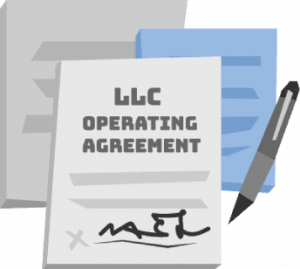How to Create an LLC in Oklahoma
To start an LLC in Oklahoma, you’ll need to follow a few basic steps: name your business, appoint an Oklahoma registered agent, and file Oklahoma Articles of Organization with a $100 filing fee. It’s also wise to secure a domain name for your business at formation as well. In order to keep your LLC legal and running smooth, you’ll need to get an EIN, open a business bank account, and draw up an LLC operating agreement, among other things.
This guide provides easy-to-follow instructions on how to start, run, and maintain an LLC in Oklahoma.

1. Name Your LLC
For your first order of business, you need a business name. You can name your LLC pretty much anything you want, as long as it complies with the naming restrictions in Oklahoma’s LLC statutes. Basically, your LLC name must:
- Contain an indicator like Limited Liability Company or LLC.
- Be unique among approved business names in Oklahoma.
- Not include words or abbreviations that make it sound like the LLC is another kind of entity, like Corp or Limited Partnership.
Check Oklahoma’s Business Entity Search page to make sure no other business is already using your preferred name. If you’re not ready to form your LLC, Oklahoma allows you to put a hold on the name by filing an Application for Reservation of a Name. It costs $10 and can be filed online or by mail. Your business name reservation is good for 60 days.
Any name you operate your LLC under that isn’t its legal name is a DBA (Oklahoma refers to DBAs as trade names). To register a DBA, you’ll need to file a Trade Name Report with the Oklahoma Secretary of State and pay a $25 fee.
Learn how how to get a Oklahoma DBA for your business.
Create An LLC In Oklahoma


2. Register Your Domain Name
After choosing your LLC’s name, a good next step is locking down a domain name for your business website. Your domain name (URL) is the web address to your site.
A professional domain name should be easy to remember—and if possible, match or complement your business name. When you register your domain early on, you’re more likely to get a name that meets those standards.
You’ll need to claim a domain name through a registrar. When you hire Northwest to form your LLC, domain registry is one of many services we provide, so you also get a domain name free for a year, plus your own customizable business website secured with SSL protection, and up to 10 email business addresses connected to that domain.

3. Designate a Registered Agent
Oklahoma state law (18 OK Stat § 18-1022) requires every LLC to have an Oklahoma registered agent. This can be you, someone you know, or you can hire a professional registered agent service. The important part is that your registered agent needs to have a local street address and agree to accept legal mail on behalf of your business.
Note: You need a registered agent before you start filling out your Oklahoma Articles of Organization.
The expectations for a registered agent are:
- To keep regular business hours (9 AM to 5 PM) at a physical address (no P.O. Boxes) in Oklahoma.
- To accept legal mail and correspondence from Oklahoma’s Secretary of State on behalf of a business.
Learn about the benefits of hiring a registered agent service for your LLC.
You sure can, but think twice before you do. Acting as your own registered agent means that your name and address becomes part of Oklahoma’s public record. When you hire Northwest, we’ll list our business address on all allowed public filings, helping keep your personal info away from scammers, spammers, and disgruntled people with a bone to pick.
Yes. To change your Oklahoma registered agent you’ll need to file a Notice of Change of Registered Agent form with the Oklahoma Secretary of State. The form costs $35 to file, and you can submit it by mail, in person, or online.

4. Submit LLC Articles of Organization
Your Articles of Organization are what legally creates your LLC as an entity in Oklahoma. When the form is completed, you’ll submit it to the Oklahoma Secretary of State online, by mail, or in person.
As you fill out your Articles of Organization, you’ll need to include the following information:
Your business name should include the words Limited Liability Company or an abbreviation like LLC.
List the street address of your company’s primary office in Oklahoma (no P.O. Boxes).
Provide an email address where the Oklahoma Secretary of State can send notifications to your LLC.
You’ll need to give your Oklahoma registered agent’s name and the street address of their office.
List your term of existence as perpetual, unless you want the LLC to expire on a certain date.
Name the person authorized to form and file your LLC Articles of Organization. This doesn’t need to be someone within your LLC.
Note: All of the information on this form will become part of the public record.
Filing Your Oklahoma Articles of Organization
Oklahoma allows you to file your Articles of Organization online, by mail, or in person.
Mail and in person filings:
Secretary of State
421 NW 13th Street
Suite 210
Oklahoma City, OK 73103
Online filings:
Oklahoma Secretary of State Entity Filing
It costs $100 to file LLC Articles of Organization in Oklahoma. Online and in-person filers paying with a credit card must also pay an additional 4% service charge.
The Secretary of State processes online filings within two days of receipt. Mailed filings take about seven business days after receipt. If you’re in a hurry, bring your paperwork to the Secretary of State’s office and pay an extra $25 to get your LLC approved in one hour.
You Formed an LLC in Oklahoma, Now What?

5. Write an LLC Operating Agreement
Your LLC’s operating agreement is the backbone of your business. Your operating agreement spells out financial contributions, management roles, voting rights, and other responsibilities expected of LLC members. Without an operating agreement, a court may view your LLC as a sole proprietorship or partnership, which could jeopardize the LLC’s liability protection.
We provide a free Operating Agreement template for LLCs in Oklahoma. Alternatively, you can hire a lawyer to draw one up for you.
No. Oklahoma does not require an operating agreement. You won’t have to file it with the state, but you will want an official written copy to keep with other important LLC documents. Your operating agreement will help you resolve any internal disputes that may arise. Plus, you’ll likely need an operating agreement in order to open a bank account for the LLC.
You can find a general list of what operating agreements usually cover in 18 OK Stat § 18-2012.2, but your agreement should address:
- initial funding of the LLC
- distribution of profits and losses
- voting rights, decision-making powers, and management
- transfer of membership interest
- how the business can be dissolved
While your operating agreement can include many other provisions, those basic items are crucial for the function of a well-run LLC.
Yes. You might not need an operating agreement to navigate a disagreement with yourself, but you’ll need an operating agreement to open a bank account and to help maintain your LLC’s limited liability.

6. Get an EIN, Bank Account & Funding
Now that your LLC is operational, you’ll want to get an EIN, open a business bank account, and fund your LLC.
For most LLCs, the answer is yes. But if you’re a single-member LLC with no employees, and you don’t mind disclosing your personal Social Security number to do business, you can skip getting an EIN. That said, banks generally expect you to have an EIN when applying for a business bank account.
Opening a business bank account is important for a few reasons. For starters, using a personal bank account to make and accept payments from customers or vendors just doesn’t look professional.
More importantly, keeping your personal finances separate from your business finances bolsters your liability protection, preventing your personal assets from being used to satisfy any business debts in the event a lawsuit or bankruptcy.
Here’s what you’ll most likely need in order to open a business bank account:
- a copy of your Oklahoma Articles of Organization
- your LLC’s EIN
- your LLC operating agreement
- if your LLC has multiple members, an LLC Resolution to Open a Bank Account
However, banks do vary on what documents a business bank account applicant needs, so contact your bank to find out specific requirements.
The easiest way to fund the LLC is for each member to make an initial financial contribution to the LLC’s bank account. The percentage of the business that each member owns should be reflected on the LLC’s capital contribution agreement and recorded on a membership certificate.
As an example, if each member of a four member LLC contributes $10,000, they’d each have a 25% membership interest in the LLC. If one member contributes $25,000 and the others $5,000 each, the most invested member would have 62.5% of the interest, with 12.5% for each of the other members.

7. File Taxes & Reports
Here’s a few more things you’ll need to be aware of in order to successfully run and maintain your Oklahoma LLC.
- Taxes: LLCs in Oklahoma with default tax classification are taxed as pass-through entities. This means that profits pass through the LLC itself and are distributed to the owners (members), who then report the profits as earnings on their personal tax filings. Profits are subject to the federal self-employment tax rate (15.3%).
- Annual Reports: Oklahoma’s annual report is an Annual Certificate. Oklahoma’s Annual Certificate keeps the state updated on important information like the LLC’s contact information and if the names of the LLC members. The report is due every year on the date your LLC was officially formed and costs $25 to file.
If remembering due dates and extra paperwork isn’t your jam, we’ll gladly file your annual report for you.
Yes. Your reports are due every year. If you forget to file, your LLC may lose its good standing with the state and might even be dissolved.
LLCs are taxed as pass-through entities by default in Oklahoma, as they are elsewhere in the country. This means that profits and losses pass through the business and are distributed to the members as income. LLCs can also elect to be taxed as S-corps or C-corps if they choose.
Learn more about S-corp vs LLC tax designation.
*This is informational commentary, not advice. This information is intended strictly for informational purposes and does not constitute legal advice or a substitute for legal counsel. This information is not intended to create, nor does your receipt, viewing, or use of it constitute, an attorney-client relationship. More information is available in our Terms of Service.
Ready to Start an LLC in Oklahoma?







